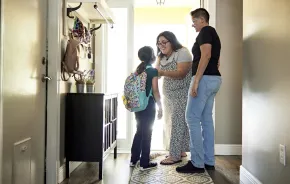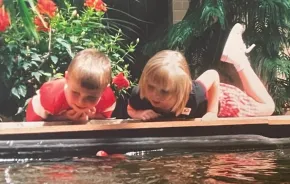
My relationship with my Taiwanese immigrant mother, Noko, has always been mediated by my father. Separated by cultural and language differences, my dad kept us apart by making us depend upon him as our translator, cementing his importance in our lives by putting himself at the center. When my son ,Tomo, was born last year, I asked Noko to stay with me to assist me in my transition to becoming a mom.
My mother made a conscious choice during my early childhood to not be a part of my life. After a heated argument with my father in which they disagreed about how to parent a daughter, my mom quietly resigned herself to leaving me alone. I can’t pinpoint the exact moment that the shift occurred, but by the time I was 13, I felt an unbridgeable distance. My childhood home was filled with silence and unspoken emotions.
I’d always been eager to engage my mother’s attention. As a kid, I asked her an endless stream of questions, concocting elaborate projects to draw her out. While she had virtually no advice to offer when it came to teenage body issues or broken hearts, if I asked her how to use a paintbrush, bind a book, or candy an orange peel, her creative resourcefulness kicked into high gear.
Growing up, I’d seen Noko not as a mother figure, but as an artist — a weaver of tapestries, builder of clay pots, a painter of landscapes and human figures. She differed from the mothers of my classmates. She was not a breadwinner, but a maker.
My mother arrived after Tomo’s birth, accompanied by my dad and a suitcase full of handmade toys. Upon seeing her grandson for the first time, my mother embraced him and chimed, Amma!, promising to teach him Taiwanese. My father coughed and declined holding Tomo, complaining of a cold. Three days later, he returned to California, having held Tomo twice: Once when I pushed Tomo into his arms, in order to dispose of a dirty diaper, and on one other occasion, when I offered to take photos of them together.
With my father gone, I worried about how my mother and I would get along. If she shared the same views as my father, concerning the decisions my husband Kort and I had made. Would she judge me for having a homebirth or delaying vaccination? How could I explain attachment parenting and how we responded to Tomo’s cries? While she had come to offer her support, would she intuitively know what I needed?
Becoming a parent had everything to do with simply “being” with my child — and yet I’d had virtually no experience of “being” at ease around my closest family members.
My mother always showed a preference for my brother, whom both of my parents hold up as “more Chinese” — his social circle included other Asians and he once took a college Mandarin class. My mother’s bond with my brother deepened when he had a nervous breakdown at the age of 21. Vowing to protect him from further suffering, it was not uncommon for my mother to help him move households or stay with him for months at a time. She slept on a tile floor while assisting my brother with painting walls and re-flooring his condo. Once, she took a two-year break from my father to cat-sit for my brother at his house in Carmel, while he lived out of a hotel in Santa Barbara. Over the years, I watched her show up for my brother time after time, wondering if she could ever be there for me in the same way.
With Kort returning to work, I felt paralyzed by my fear of failure and isolation. The uncertainty of engaging a newborn without words — combined with the anxiety of communicating with my mother — completely overwhelmed me. Becoming a parent had everything to do with simply “being” with my child — and yet I’d had virtually no experience of “being” at ease around my closest family members.
My mother stayed for three weeks. During that time, we sat together wordlessly in darkened rooms, she kept me company while I held my sleeping son. She cooked the familiar foods of my childhood: simple chicken stir-fries and glass noodles. She stood beside me and screamed with me when Tomo let loose on the diaper-changing table. She held Tomo countless hours so that I could rest. Delighting in singing to him, she surprised me with her rendition of “You Are My Sunshine," a song she recalled from my brother’s childhood record collection. When she flew back to California, I wept. My mother had been fully present with me.
 Noko returned to Seattle this past spring, to support me during a time when I struggled with post-partum depression, complicated by sleep deprivation and extreme stress. My mind fixated on the expression ichi-go, ichi-e — one meeting, one opportunity — wondering if our visit could be as happy as her first stay. She arrived the same week that I was laid off from work.
Noko returned to Seattle this past spring, to support me during a time when I struggled with post-partum depression, complicated by sleep deprivation and extreme stress. My mind fixated on the expression ichi-go, ichi-e — one meeting, one opportunity — wondering if our visit could be as happy as her first stay. She arrived the same week that I was laid off from work.
Struggling to find the words to translate my situation to my mom, we arrived quickly at one understanding: that we would keep my job loss secret from my father. As my mother opened up about the challenges of my father’s own chronic unemployment and failed businesses, her experiences of being cut off from her own parents as an immigrant, and the tensions between my father and her, her stories gave me new insight into her life.
She recounted the hardship of caring for my older brother by herself, while my father worked long hours. Alone in student housing, my mother’s face burned with shame when the neighbors knocked on my parents’ door to complain about the crying baby. She and my brother returned to Taiwan when her visa expired until she gained re-entry to the U.S. But she never dreamed of leaving Taiwan in the first place.
For decades, I saw my mother as my father perceives her: a timid and dependent female limited by her unwillingness to achieve fluency in the English language. But in the act of holding on to her language and her identity, she grew into the deeply resourceful person that I have come to know during her visits to Seattle. As I find myself writing about my mother, I realize that I became a writer to fulfill a desire to find a common ground with her, to develop a way to communicate outside of the presence of the men in our lives. The gift of her deep presence has been not simply the gift of creative expression, but the means to transform even the hardest of circumstances into resources that can sustain an imaginative life.












